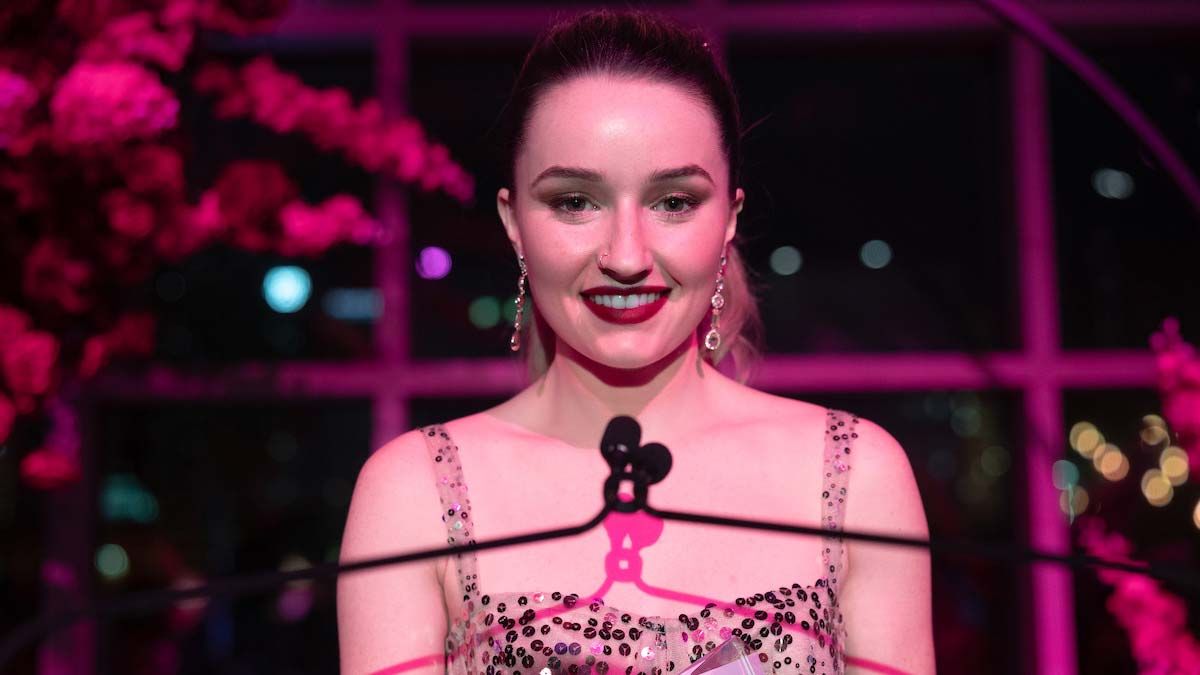Netflix mini-series APPLE CIDER VINEGAR is now available to screen. Created by Samantha Strauss, the series is inspired by true events as it follows the stories of two women who, through social media, share their cancer-treatment journey while promoting alternative dietary treatments. Only one of them actually has cancer, and in the series, they become rivals—dueling influencers in the wellness world.
I just binge-watched the entire thing, much to the dismay of my husband, whose computer I “borrowed” for what he thought was a quick email check but turned into a full-blown TV marathon.
As is my custom, I watched this project with a particular focus on the area where an upcoming guest had worked. This wasn’t just a courtesy—it was an intentional way to deepen my understanding of the filmmaking craft. But this time, something felt different. I had been enlightened by a key insight from a past podcast episode—specifically, our conversation with Liz Toonkel, the production designer of the feature film Skin Care.
This is a MUST LISTEN episode. Check it out here, you won’t regret it:
https://podcasts.apple.com/us/podcast/filmmaker-mixer/id1663638176?i=1000690819368
In that episode, Liz Toonkel discussed how she collaborates with the director to weave storytelling into production design. At first glance, that might seem like a straightforward statement—but as I learned more from Liz, I realized just how layered and intricate that process truly is. For me, it was a revelation. Unlike my co-hosts on the Filmmaker Mixer podcast, I didn’t attend film school, so every conversation serves as part of my ongoing education in the art of filmmaking.
Liz’s insight about using production design to reflect a character’s transformational arc stuck with me. With that in mind, I set out to observe similar storytelling techniques in the hair and makeup design of Apple Cider Vinegar. As I screened the series, I paid close attention to these details, knowing I’d be discussing them in my review—especially since our upcoming guest, Helen Magelakis, served as the makeup designer for all six episodes. Helen was part of a larger hair and makeup team, but her role in shaping the series’ visual storytelling made me eager to explore her approach.
Before I get into what I noticed, I want to name drop someone else who had an impact on me: living legend, actor Danny Trejo. Mr. Trejo taught me a valuable lesson about the importance of respecting everyone on set, regardless of their role. During my brief time as an intern on the set of MACHETE, Mr. Trejo was very accessible and I even asked him about it.
Mr. Trejo told me that a movie could NOT happen without everyone involved and that not ONE job was MORE important than ANY other! I share this because I’m certain the valuable lesson from Mr. Trejo’s shaped my approach to reviewing films. His emphasis on respect inspired me to honor our guests by spotlighting their contributions to a project, ensuring their work gets the recognition it deserves.
The fact that my co-hosts, filmmakers Jeff Stolhand and Andrew Lamping, are exceptionally skilled at drawing insightful information from our podcast guests makes a real difference. Their ability to ask sharp, thoughtful questions elevates every conversation. Having firsthand experience with the challenges of small-footprint productions—where everyone often wears multiple hats—they deeply appreciate the efforts of others. This perspective allows them to not only recognize the value of each contributor but also extract meaningful insights from subject matter experts.
With all that being said, the story I watched unfold for the make-up design in APPLE CIDER VINEGAR was fantastic.
When we first meet Belle Gibson—the main character destined to be exposed as a charity fraudster, portrayed by Kaitlyn Dever—I couldn’t help but notice her slightly wonky eyeliner. I’m convinced this tiny imperfection was intentional. In filmmaking, every department contributes to the layers of storytelling, and this felt like a subtle yet deliberate choice. It’s a small detail, and maybe I’m reading too much into it, but to me, it served as a quiet cue that said, Something about her is just a little off.
When we meet cancer patient Milla Blake, portrayed by Alycia Debnam Carey, she is fresh faced and gorgeous. Throughout the series, we witness her transformation. By the midpoint of her arc, she is in full glam, her appearance reflecting her elevated status as a woman being recognized for an award. As her illness progresses, she is styled to appear gaunt, sickly, and visibly unwell.
These may seem like simple details to notice, but they are crucial for realism. I say this because I once read a review of the 2012 Total Recall remake that perfectly captured a thought I had throughout the film. The author—who might as well have been my spirit animal—pointed out how Kate Beckinsale was kicking ass and taking names with perfectly bouncy hair.
This was before my informal Film Aesthetics 101 training from our podcast guests, but even then, it stood out to me. Her hair was so distractingly flawless during intense action scenes that it almost felt like another character. The reviewer articulated this so perfectly that I’ve never forgotten it. I even tried to track down the article to share here but came up empty. Still, that critique has stuck with me ever since.
I enjoyed APPLE CIDER VINEGAR. I googled what was the true story and the fact is the two women in the series did know each other but not as portrayed in the show. I don’t want to spoil the series by saying more. However, the character of Chanelle McAuliffe, as played by Aisha Dee, does have scenarios that actually happened-included in the series. I highly recommend you watch this series and then google about to find out if you guessed correctly on what bits were real and what was feigned.
I do want to add one more kudo to actor Ashley Zuckerman, who portrayed Bella’s long-term partner, Clive Rothwell. Ashley was amazing and at one point I felt genuine ‘falling in love feeling’ with him solely based on this one truly tender expression he made when telling Bella he did love her. I believed him and his character’s actions were so sincere-Ashely was fantastic in this role- truly playing a nice guy that honestly. Clive deserved better than Bella (in my opinion).
I highly recommend APPLE CIDER VINEGAR and applaud everyone on the project for their efforts to show a cautionary tale about alternative treatments for illnesses.
Like the filmmakers behind the recently released documentary, FOOD FOR THOUGHT, it is very noble for storytellers to use the craft of filmmaking to indirectly educate people while entertaining them. Cinema is such an effective means to get various important points across.
Just as a single smudge of eyeliner (or very realistic ring worm symptoms) can speak volumes, the hair and makeup team’s attention to detail adds depth to the storytelling—bravo to them! And a special shoutout to Helen for her artistry and contribution.
Melody Lopez (Producer, Filmmaker Mixer Podcast) posted by Madelyn (Correspondent, Filmmaker Mixer)

